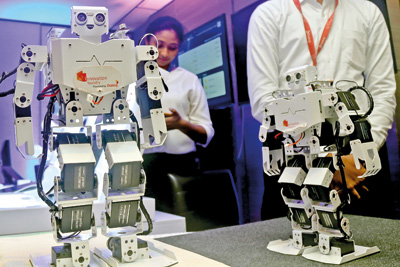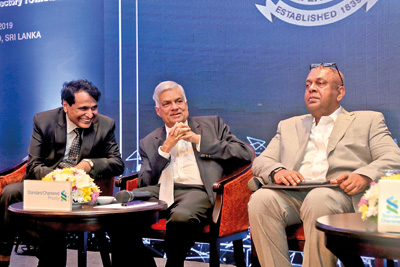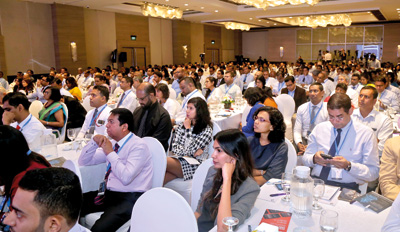Making public institutions work with private sector care
CCC Economic Summit
Experts at this week’s Sri Lanka Economic Summit though convinced of the resilience and ability for growth highlighted that the economy needs to face up to geopolitical disruptions; issues relating to the State Owned Enterprises (SOEs) ; and make the right choices of remaining in the middle income trap or making a leapfrog to becoming South Asia’s first advanced economy.

Innovative products on display
The two-day summit comprised four sessions on each day with a number of local and international speakers addressing the participants. The Keynote Session on the first day with key speakers was based on the theme “Re-calibrating Sri Lanka’s Economic Trajectory.”
Options for Sri Lankans
Chief Guest Prime Minister Ranil Wickremesinghe detailed some of the forward looking options available to leap frog into the future that would ensure Sri Lanka would become the first advanced economy in South Asia.
He noted that Sri Lanka’s options lie in tying itself up with bilateral agreements because “that is where the money is”.
Detailing plans to push forward the shipping sector and the ports he noted that they had already worked this out for the West Terminal and the North Port, in addition to the Trincomalee and Hambantota ports that would fall in line.
The airports around the country were being developed with the expansion on the Colombo, Mattala, and the new Jaffna or Palali airport and one regional airport that would ensure flights between India and Sri Lanka, he said.
Tourism, he pointed out was showing “great potential” and noted that soon after the Easter bombings the country saw the arrival of Indian Prime Minister Narendra Modi, Maldivian parliamentarians and the international Bohra community that proved encouraging.
Following the aftermath “everyone responsible is in custody,” he said adding that “You all lost confidence in the government and even wanted the rest of the 225 (MPs) to go home” at the time and opined how they were able to take that decision.
“We were in an unhappy marriage but nevertheless we had to produce results,” he said clearing making reference to the President’s alliance in the government and noted that they have to create a clean break.
Referring to high interest rates imposed on the economy he noted that this was essential in order to stabilise the economy and that has proved results as now “there is a surplus in our primary budget” since the 1950s. He noted that even during the 1970s the country was running at a deficit.
In this manner the government was able to increase their revenue and tackle the financial mismanagement and with the introduction of a new Exchange Act he queried should “we safeguard this or not”.
“Government means making unpopular decision, not popular decisions. Otherwise you might as well have a pop star!” he exclaimed.
As an upper middle income country, the Prime Minister asked if the country was ready to either stagnate in this position or have a leap frog projector which will make it an advanced economy.
A governmental system with “radical restructuring” was imperative to becoming an advanced economy and in this respect Mr. Wickremesinghe proposed a new outlook modelled on the private sector with the Treasury similar to its counterpart in New Zealand and a delivery oriented public sector.
“We must pull up our boot straps to become the first advanced economy in South Asia,” the Prime Minister said.
Ceylon Chamber of Commerce Chairman Hans Wijayasuriya addressing the session noted that Sri Lanka’s economic growth had to be addressed in the context of social and political backdrop.
He noted that the economy faced a number of constraints including disharmony in the aftermath of the April 21 attacks but as a resilient economy “we must overcome and go beyond”.
Mr. Wijayasuriya pointed out that they needed to strengthen the arm of the government and in this respect need to be productive and put forward the “power of collectivism”.
As part of the CCC’s vision he said that they believed the US$89 billion economy could reach $134 billion in five years.
In this respect, there is a need to consolidate and pivot on “our” fundamental strengths like fiscal discipline, macro stability, per capita GDP, global competitiveness indices, global market access, a strategic location, international relations and global flagship industries, human development index, quality of life, freedom established and resilience as a nation.
Sri Lanka should choose to escape the middle income trap, he opined and in this respect increase its exports to surpass imports and generate investment to reduce its debts.
He supported the idea of the public private partnership and said they would seek government public policy reforms and added that the private sector should be involved in investment and risk participation.
Finance Minister Mangala Samaraweera, Guest of Honour at the summit, believed that Sri Lanka needed to learn from its mistakes in order to re-calibrate the economy.
He noted that the post war boom failed to realise and by 2015 Sri Lanka was close to a closed economy.
However, on the contrary Sri Lanka has today signed about six Free Trade Agreements and yet far behind in terms of competition since the country has not diversified.
Impressive numbers given out in the past were “artificial creations,” he said adding that back then Sri Lanka was at the mercy of financial markets.
The country had an airport with only one large plane at the airport but today they are in the process of expanding the macro-economic stability, the minister said.
“SriLankan Airlines is a vanity we could hardly afford,” he said pointing out the difficult situation the country was set into.
Central Bank Governor Dr. Indrajit Coomaraswamy making his observations noted that investors continued to have confidence in Sri Lanka “than we do”.

Prime Minister in Conversation
Raising $2.5 billion in March through a bond sale and later in April making over $2 billion it was clear that things were to Sri Lanka’s advantage.
In this respect, he noted that if the country could maintain discipline then re-calibrating will not be difficult but “we need to press ahead”.
Global disruptions
India’s former Commerce and Industry and Civil Aviation Minister Shri Suresh Prabhu during the first session speaking on the “Global Dynamics in the next decade” said that the disruption in the global supply chains has impacted all and in this respect each country should draw up their own strategic plans.
He believed Sri Lanka has huge potential in many areas but strategies for growth must not disturb its natural beauty.
Mr. Prabhu pointed out that the disruption caused by geopolitics would affect the geo economy and blaming someone else for ills in one’s own country is pointless since all are interconnected.
He noted that Sri Lanka’s biggest advantage is human development that should be preceded by social development and Sri Lanka is not at a time when it is poised for economic growth.
Board of Investment Chairman Mangala Yapa commented that the Foreign Direct Investments (FDIs) had been a disaster and in 2018 the global FDI had been declining.
Sri Lanka has seen over a five year annual growth and made a growth of 84 per cent with $2.36 billion.
But the country faces challenges as the industries need to look at bilateral trade to improve and cater to a market beyond the 21 million population, he explained.
FDI growth centred in the Western Province is a challenge for which authorities need to find a solution in order to sustain investments and go to the regions.
JKH Chairman Krishan Balendra said that they have noticed a faster recovery in the leisure sector due mainly to the low base numbers.
Moreover, he pointed out Sri Lanka is also only hours away from India and Indians travelling to Maldives has risen by 50 per cent, to Phuket over 300 per cent so Sri Lanka is the next big thing to happen.
In this manner, he noted global events were unlikely to impact on Sri Lanka and even so for the port sector investments and the new terminal has added 50 per cent and growth has been rapid with capacity today recorded at 8 million TEUs.
State owned to be or not to be
On day two of the summit, the session titled “State-Owned Enterprises – Recipe for Reform” saw flare-ups and interesting debates on how SOEs should be handled in the Sri Lankan context.
State Minister of Finance Eran Wickramaratne addressing the gathering said that Sri Lanka should take into consideration the need for certain SOEs and noted that in view of the Ceylon Electricity Board (CEB) the government is hanging onto it for social reasons; but pointed out that in the case of the national carrier it was not imperative to do so.
Removing political interference was a crucial factor highlighted by a number of speakers on the subject.
“We do not have to own most of it – but if for a strategic reason then it is for a political price – then it has to be compensated through the national budget,” the minister said.
MP Dr. Sarath Amunugama said that based on past experience employees in SOEs must have confidence in the parties they are discussing their issues with and note that any party must think of what the state can do and what is the role of the private sector.
Commenting on over staffing causing problems at SOEs he termed this to be “a political parking place of political refugees.”
An interesting argument he made later was that Sri Lanka must realise that most of its SOEs are run in a system that is failure and the need is to find a new way of unleashing creativity. “We are just groping around while the examples of the whole world are around us.”
By subsidising heavily through the banking sector “we have crippled the banking sector as well,”, he noted.
Helicon Corporate Consultancy Chairman Dr. Nalaka Godahewa said he believes that privatisation of public institutions was not carried out properly by former governments.
In this respect, he believed that there needs to be a very strong private sector and an equally strong public sector.
Dr. Amunugama also queried the possibility of growth when the land is released at actual valuations. In this context he stated that India’s growth is being challenged and noted that the regional governments were not releasing lands for projects.
JVP representative Dr. Anil Fernando explained that the JVP stance was that nothing but the public interest should be taken into account in the case of SOEs.
A self-serving structure cannot assure the public interest and ownership structure was important; but pointed out that they were not in disagreement with the existence of private sector control and noted their policy was for a public private partnership.
Finance Ministry run – National Agency for Public Private Partnership Chairman Thilan Wijesinghe made a case for the SOEs insisting that they too could function in the same profitable capacity if established with the right systems in place.

Audience Pic by Ishanka Sunimal
“Selling is equal to the creation and mollycoddling of SOEs,” he said adding that this would lead to a “white elephant” resulting in the erosion of the country’s economy.
Departing from political thinking, he noted that the Finance Ministry needed to become a “shareholder activist” to go forward, Mr. Wijesinghe noted.
He called for stock exchange-type disclosures to increase transparency and believed that the key enterprise of reform lay in public private partnerships.
Mr. Wijesinghe also asserted that minus political interference things could run better while admitting that “wrong things have happened.”
Politics and its leaders talk
The closing forum was the Political Leadership Forum centring on the discussions of today’s core issues and how future governments would resolve them giving a sneak peek into plans of the next political leaders.
Highways and Petroleum Resources Minister Kabir Hashim addressing the issue of SOEs pointed out that the government had introduced KPIs and professional management and even adopting formula based pricing on petroleum products. “You need time, space and a very strong government to do reform,” he said.
He also pointed to the Transport Board that was initially a loss-making institution and which is currently running at a profit. “There shouldn’t be a conflict between owner and entity,” he said.
Minister Hashim observed that in terms of taxes, some people were unfairly taxed and that revenue policies in certain sectors needed to be amended with 20 per cent direct and 80 per cent indirect taxes.
“Paying taxes is a civic responsibility,” he said adding that the country requires an effective targeting of payment.
Commenting on the current system, Minister Hashim noted that ever since Sri Lanka opened up its economy no successive governments have changed the pattern either. “We are looking at trade policy without hurting domestic industry.”
MP Bandula Gunawardena addressing the issue of taxes pointed out that the present government had increased this significantly clearly impacting on the people. In fact, he noted that the government has reached a point where they could now no longer increase rates.
Commenting on SOEs he pointed out that it was overstaffed in that there were 65 public servants for every 1000 citizens which is considered the highest among most countries, he said.
In effect proper planning of human resources management and ensuring productivity was crucial and noted that salary increases should be based on productivity.
JVP MP Bimal Ratnayaka identified SOEs as a “political problem” and not a management issue and followed it up with the example of how one SOE, the state Gem and Jewellery Corporation was headed by six Chairmen and four Director Generals within a very short time span.
He also criticised the appointments of posts of heads of the respective government institutions that had brothers of ministers heading them leaving it open to question whether such brothers were experts in all these fields.
Mr. Ratnayaka noted that taxes were imperative in today’s context in order to make SOEs profitable since this has continued to be the pattern for the past 30-40 years. “We propose SOEs to be made profitable and get loans to phase this out.”
On bilateral ties he believed there needs to be an exercise followed whereby the Commerce Department could be used to ascertain the country’s requirements and base these agreements on local trade, he explained.
The final session then concluded with a discussion on women empowerment as well as a look at social inclusivity. The discussions at the summit created a space to look at what future voters could await as well as the impacts on business activity in addition to a forward thinking study to understand how systems could be changed to make economic progress.


